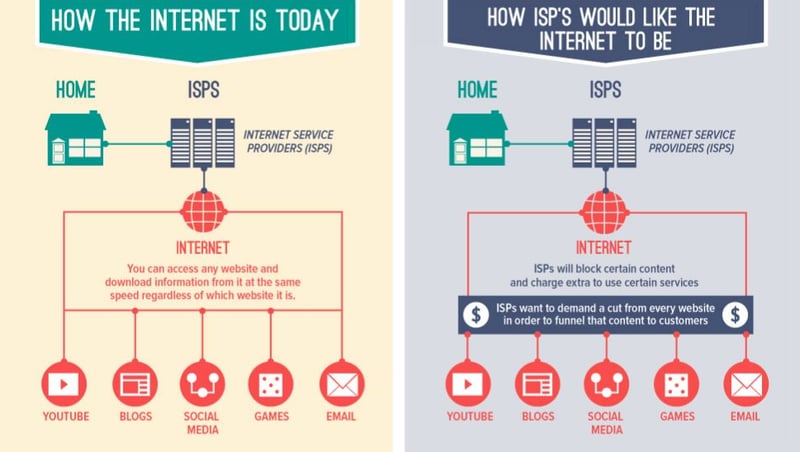Why Net Neutrality is Important to Storytellers and Their Audiences
 By
Michael-Ryan
·
3 minute read
By
Michael-Ryan
·
3 minute read
UPDATE: The President has made a statement in support of Net Neutrality. Please read about his plan on the White House website. If you think a free and open internet is a good thing, sign the petition to tell the FCC you stand with the President's plan to protect net neutrality.
Editor's Note: Originally published on June 20, 2014.
Everything you need to know about Net Neutrality
- Net Neutrality (sometimes called an “Open Internet”) means that all data on the Internet is considered equal. It is the founding principal the Internet was built on… every email, website, video, cat picture, app, eBook, and song is considered a byte of data equal to any other byte of data, regardless of who made it.
- Internet Service Providers, or ISPs, are the corporations who control connectivity and communication through the Internet. There are only a few of them, and they are the ones who allow your computers and mobile devices to get online.
- The Problem is that currently in America the ISPs are not regulated, and have therefore started using their gatekeeper power to offer two speeds, and charge a premium to larger companies like Google and Netflix. That means that large companies would be forced to pay the premium to continue providing a service for consumers (the cost most likely being put on the consumer through higher prices), and that their data would be considered a higher class than small company and personal data. The opposite of Net Neutrality. This is not a theory of what ISPs might do with unchecked power, this is something ISPs have already done to consumers through blocking and throttling.
- Potential Solutions are being considered throughout Washington, DC. Today the House Judiciary Subcommittee is holding a hearing on protecting consumers and innovation through trade regulation or antitrust laws. If antitrust laws are used, it could take years for the FTC to get a handle on the ISPs. If trade regulations were used, it would fall on the FCC to enforce.
A Little History on Hollywood
Many years ago when there was no Internet, or television for that matter, the major studios were the movie producers and distributors. This gave them tremendous gatekeeper power because they could tell the stories they wanted to tell, as well as block any stories they did not want told over their distribution network, and the consumer (audience as we call them) choice was limited to cinema venues. Eventually, the government caught on and used the anti trust laws to break up the so-called “studio system.”
A lot has changed since then like the advent of television and the Internet, but some things still remain, such as the five major studios using their collective gatekeeper power to control what stories are told. Moreover, these studios are now parts of major publically-traded multinational corporations, so the decisions and media they make are based largely on their new customer – “shareholders” - rather than the authentic consumer audience. This is why the studios are largely focused on making a lot of “re-imagined” reboots and sequels with very little new or original storytelling.
Independent Storytellers
The studios have a massive worldwide distribution system that is hungry for more content than the studios can produce themselves, which is where the small and medium sized “independent” production companies and their storytellers come in. Essentially, the production company finances a project, completes it, and then if one of the studios thinks it is “worthy” of distribution, then they will (hopefully) pay a reasonable market price to purchase the project and distribute it, as well as give a portion of the profits to the production company from revenues. Hollywood Accounting usually circumvents this backend participation. But then the Internet came along… no more gatekeepers.
The Internet has given independent storytellers a whole new set of options and opportunities, and consumer audiences have benefited. Now storytellers can again tell stories they want to tell, for their audiences, without the limitations imposed by gatekeeper studio distribution. They can split up and distribute their content theatrically, on television, and through the Internet so that they can receive revenues from multiple sources, and hopefully make enough to tell another story. This allows them to take chances. To innovate. To change the worldview. To be free of the gatekeepers. Unregulated ISPs threaten that freedom for storytellers and their consumer audiences.
The FCC Can Fix The Problem
As the CEO of a media and technology company, I am in the unique position of producing both the content data (media), as well as innovating the delivery systems (technology). In fact, we are making technologies such as 3DPOV® that require both pieces working together to make a unique experience for the consumer audience. But ISPs becoming the new gatekeepers will again stifle creativity, and what’s worse, the new innovations being built to give consumer audiences something new and exciting.
The FCC has the authority and power to fix the problem now, but has clearly been crushed under the financial and political pressure of the ISPs. The FCC has the authority to classify the ISPs as a “telecommunications service” under Title II of the Communications Act and use that as the legal basis to assert its power to keep the Internet neutral and open, and not allow ISPs to place data premiums and classifications on the networks they are gatekeepers to. In my opinion, as both a storyteller and distributor that is trying to continually push boundaries, this is the best option to keep the Internet open and neutral.
Right now, the FCC is taking public comments on “Protecting and Promoting the Open Internet.” If you want to get involved, please tell the FCC to classify ISPs as a telecommunications service and not allow a “two-lane” system.

